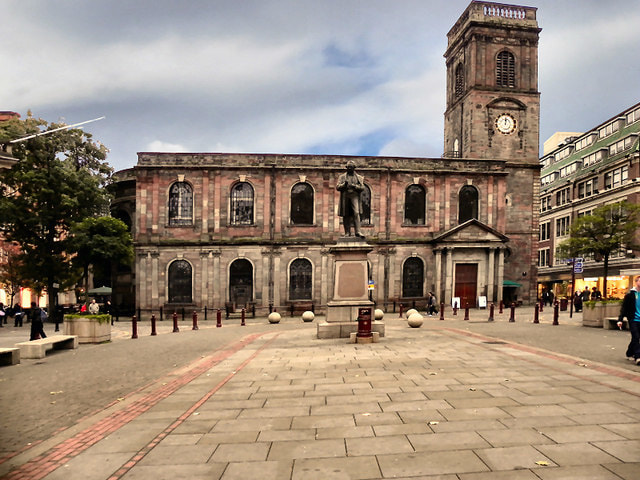|
On Saturday 5th May 2018 I was fortunate enough to be in Utrecht and attend the world premiere of Defiance, a new work that I had been approached to write for the Fairey Brass Band, supported by Brass Band England & funded by PRSF. Fairey Band were representing England at the prestigious European Brass Band Championships, with each band playing the set test piece A Time for Outrage, a wonderful work from Marco Putz, originally for Fanfare Orchestra, arranged for the occasion by my friend Paul McGhee (a brilliant composer himself) and the following day performing an own choice work. In this competition (as with others in the brass band world) it is closed adjudication, yes that’s right, the three adjudicators sit in a box/tent all day, have the scores in advance of the event, but can’t see which bands are playing.
For this reason I was asked not to speak about the piece prior to the world premiere, with several brass band publications contacting me for information about the piece, and graciously understanding that I thought it best not to give the story away until the day, and one online brass band website publishing information about the piece a couple of days prior to premiere, the information wasn’t from me, and was partially accurate. Hence writing a short blog post-premiere giving a few thoughts. Also, and by chance, Defiance was the only world premiere at the EBBC 2018, so credit to Fairey Band, Brass Band England & PRSF for taking a musical risk and commissioning a new work! Special thanks to Jim Fieldhouse, Lucy & Garry Cutt & Mike Kilroy. It’s important to me to remember how the commission came to be, I’ve been approached and written for bands including Stavanger/Allan Withington, Grimethorpe/Bob Childs and now Fairey Band conducted by Garry Cutt, but the introduction to brass bands over ten years ago was via my hometown band, the world famous Foden’s Band, who I have become a fan of, and will be forever, and whom I have the utmost respect for, with Foden’s musicians present and past becoming great friends. There’s more information about the collaboration with Foden’s at this link here. Defiance is about a subject close to my heart, the city of Manchester & the spirit of the people of Manchester. I have old concert programmes at home of my grandmother giving solo piano recitals at St. Ann’s Church in central Manchester from the 1930s, and this tied in to the time that the Fairey Band was formed (1937). St. Ann’s Square also holds a poignancy as I visited the incredible floral memorial there to the people that lost their lives in the tragedy at Manchester Arena last year. I moved from Poole to Manchester in 1985, to study saxophone at the Royal Northern College of Music, my family were pleased as they used to be North West based, Manchester & Liverpool respectively. Manchester is a city that I fell in love with, and most but not all weeks I’ll be in Manchester at some point (teaching at the RNCM, gigging etc.). So after the approach from Fairey Band we discussed in detail the title and concept of the new work, acutely aware that if reference was made to the tragedy of last year that it is a very real and sensitive matter. Direct reference isn’t made to this tragic event, nor the IRA bombing in Manchester in June 1996, the concept of the work refers to the incredible response from the people of Manchester in times of tragedy and adversity, to times of celebration and positivity. The city has reinvented itself and continues to do so, has a huge energy and vibrancy, is modern yet respects tradition, and once this concept was formed then came the challenge of writing the music itself. The opening section of Defiance is choral-like, building dynamically (one of the many things that brass bands do brilliantly) to a moment that basically says ‘F*** You’ to anyone that thinks they may hurt the people and the city. What follows is an upbeat 1930’s jazz-influenced 4 minutes, soloists and sections are tested, another test for the performers being that of understanding of feel and groove of the music, it needs to swing! The centre of the work features two extended unaccompanied solos, for Eb bass and flugelhorn. This gives us an opportunity to have a more intimate look at the players, and also requires nerves of steel in performance and under pressure, something that Gav & Lucy did brilliantly in Utrecht. The second half of Defiance is almost industrial, is about development and regeneration, it acknowledges music from times in the 1980’s and 1990’s, and I hope has a grit and attitude to it. Blocks of sounds follow with challenging time signature changes before similar challenges but for a quartet of solo cornet, trombone, flugehorn & euphonium, all expertly directed by Garry. The conclusion commences with a time of reflection, sadness, but out of the sadness emerges a spirit, a will and desire, that is even stronger than at the beginning of the piece. Actions speak louder than words, so I hope that you might be able to listen to a recording of Defiance at some point soon! However, I still felt it important to write this, even if only one person only reads it. Music can be powerful and I am thankful that my life is in music and this is the best way that I am able to show my respect to the spirit of the people of Manchester.
1 Comment
Leave a Reply. |
news items and blog posts by Andy ScottArchives
May 2023
|
